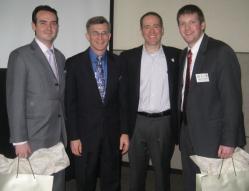Summer 2008 CIDRA Forum
 | |
The newsletter of the July 2008 CIDRA: Entering our second decade Dear CIDRA Friends: Welcome to the Newsletter of the Chicago International Dispute Resolution Association 2008 Summer edition. We present you with updates on relevant legal precedent, CIDRA speaker summaries and important news in the area of international commercial arbitration. We appreciate your feedback and look forward to publishing your articles or comments. Please look for upcoming events and information at www.cidra.org. In this edition, we examine the implications of the Supreme Court’s Hall Street decision on notions of party autonomy and “manifest disregard of the law” as a nonstatutory means of vacatur. We also revisit alternative dispute resolution basics in a recent presentation at an Illinois State Bar Association seminar on Intellectual Property and International Law Issues in Representing a Globally Expanding Company. The paper is entitled “International Commercial Arbitration: ADR in Cross-Border Business Disputes.” This year marks a period of growth for CIDRA. In its 11th year, CIDRA began 2008 by co-sponsoring the largest Chicago Mini-Moot competition turnout to date (7 regional law schools, over 40 arbitrators), hosting a variety of speakers, and collaborating with area law firms on various arbitral conferences. In addition, we have added experienced arbitrators to the CIDRA panel. It is our pleasure to introduce you to CIDRA Arbitration Panelists Jeffrey W. Sarles (Chicago), Lawrence S. Schaner (Chicago) and R.K. Sanghi (India). Sadly, however, we also experienced a great loss this year. We mourn the passing of our friend and colleague Stephen Smith (Chicago Tribune Article). Our wishes go out to his family and friends. We look forward to seeing you soon. Peter V. Baugher |
CONTENTS
Recent Events
Spotlight on China
New CIDRA panelists
CIDRA rules revision meeting
New CIDRA Intern
Hall Street v. Mattel
Closing Arguments
ARTICLES OF INTEREST
- US and China to negotiate investment Treaty. (Bloomberg)
- Banks vs. Consumers (BusinessWeek)
SAVE THE DATE
July 29, 2008
CIDRA rules revision meeting (location TBD)
September 19, 2008
CIDRA Mtg: Jane Player, Bird & Bird (London office)
February 09, 2008
Chicago Vis Mini-Moot
Read on using the links below, or download the PDF file.
| Attachment | Size |
|---|---|
| CIDRA_July_Newsletter_2008.pdf | 401.26 KB |
Summer 2008 CIDRA Forum - 2
CIDRA In Action
CIDRA has held several events in the last several months.
The first was at the Chicago Bar Association in February. Mr. Ramon Mullerat, O.B.E., was hosted by John Marshall Law School. He discussed the culture and attitudes of EU area lawyers and arbitrators towards arbitrating and mediating business disputes.
The second event featured Prof. Margaret Moses of the Loyola University Chicago School of Law. Professor Moses discussed her recent trip to Europe and Hong Kong, where she researched her new book, The Principles and Practice of International Commercial Arbitration, published by the Cambridge University Press. Professor Moses teaches various courses in international law at Loyola and is the head of Loyola’s international program. In addition, Prof. Moses coaches the Vis Moot Court team, which competes in the annual Vis Mini-Moot sponsored in part by CIDRA. Contact CIDRA if you are interested in ordering a copy.
CIDRA members attended a lecture hosted at Jenner & Block by CIDRA Arbitrator Lawrence Schaner. The lecture featured Teresa Cheng, president of the Chartered Institute of Arbitrators, who discussed “the Possibilities of combining Arbitration and Mediation: the Perils and Opportunities.”
CIDRA would like to thank the presenters and hosts.
Spotlight on China:
Susan Walker and Rod Heard Discuss Chinese Arbitration
|
In June, Rod Heard and Susan Walker gave a presentation to CIDRA about their recent visit to Hong Kong and China.
Ms. Walker, a FINRA arbitrator and adjunct faculty member at DePaul University College of Law, discussed arbitrating in Hong Kong. She highlighted important cross-cultural differences between legal systems. Chinese law, for example, tempers strict contract interpretation with strong notions of “fairness” and “compassion.”
She also addressed substantive enforcement issues between Hong Kong and mainland China. Before 1997, Hong Kong was a signatory to the New York Convention through the UK, but since the turnover in 1997 has been a signatory through the People’s Republic of China. A law was recently passed addressing the enforcement of a Hong Kong award on the mainland, but the practical effect of the law is still uncertain. Sue mentioned that the farther from the major commercial centers when seeking enforcement the harder it may be to convince a local judge to enforce arbitral awards.
|
Mr. Heard addressed arbitration in mainland China. China is one of the most important markets for international business. Rapidly developing, China’s presence in international arbitration practice is quickly growing. The most important arbitral body in China is CIETAC. Mr. Heard noted that despite some skepticism about CIETAC arbitrators’ neutrality due to the group’s proximity to government, as well as the overwhelmingly Chinese list of neutrals, CIETAC is working to improve its international stature and credibility. He attributes this to a group of young administrators who are traveling the globe and asking international arbitrators how CIETAC can improve. Similar to Hong Kong, questions remain about enforceability of an award in more remote provinces.
Summer 2008 CIDRA Forum - 3
 |
| Mr. Schaner |
 |
| Mr. Sarles |
CIDRA Welcomes New Arbitrators
This year, CIDRA added several arbitrators to its ranks including: Lawrence Schaner, Jeffrey Sarles and R.K. Sanghi.
Mr. Schaner is a partner at Jenner & Block in Chicago where he is Chair of the Arbitration: Domestic and International practice, as well as the chair of the firm’s International Committee. He is also the President of the Chartered Institute of Arbitrators, Chicago Chapter.
Mr. Sarles is a partner at Mayer Brown in Chicago, where he leads the firm’s Appellate Group, as well as its International Arbitration Group. He has represented companies before many of the major arbitral tribunals, including ththe AAA, ICC, and LCIA.
Mr. Sanghi comes to CIDRA from New Delhi, India, where he is a partner with
the International Trade Law Consultants. He specializes in arbitration, international trade law and corporate law.
More information on our arbitrators is available on CIDRA’s website
CIDRA Rules Revision Meeting
CIDRA’s Rules were last revised in 2005. In recent months, CIDRA members expressed interest in discussing potential revisions to certain CIDRA rules, most notably Article 25 on interim relief.
The ICDR has a novel rule (article 37) empowering emergency arbitrators to grant interim relief. A meeting is scheduled July 29 to debate whether it would be beneficial to make similar changes to the Rules and what changes, if any, to make. Updates will be sent out via email with a brief concerning the issues presented.
The revisions may expand to cover CIDRA’s rules on discovery and consolidation as well.
CIDRA Introduces Summer Intern

This summer, CIDRA appointed Nate Hall as its intern. Nate recently finished his first year at Loyola University Chicago School of Law. Nate originally hails from Cleveland, OH and attended Miami University, Oxford Ohio for his undergraduate studies, where he majored in Diplomacy and Foreign Affairs, with minors in French, and European Area Studies.
Nate is interested in international business transactions, as well as international dispute resolution. He intends to compete with one of Loyola’s Vis Moot Court teams next year.
Summer 2008 CIDRA Forum - 4
Under the Camel’s Nose: Will “Manifest Disregard of the Law” Survive Hall Street?
By Scott Leonard
On March 25, 2008, the U.S. Supreme Court held that parties may not privately contract for expanded court review of arbitration awards beyond the limited grounds provided in Sections 10 and 11 of the Federal Arbitration Act (“FAA”). See, Hall Street Associates, L.L.C. v. Mattel, Inc. 128 S.Ct. 1396 (2008).
The Court’s decision resolves a split among the federal circuit courts of appeal on the issue of whether a party may contract to expand the grounds for review of an arbitral award.
The decision, however, may indirectly threaten the doctrine of “manifest disregard of the law” as a viable common law challenge to arbitral awards. It remains to be seen whether this popular method of attacking arbitral awards survives the decision.
Although the decision does not resolve this question directly, it will have a broad impact on the practice.
Background
This case involved a landlord-tenant lease dispute. Hall Street, the landlord, initially sued Mattel seeking, among other things, indemnity for the costs of environmental clean up and damages to the property while (and before) Mattel occupied the premises.
The lease included an indemnity provision requiring the tenant to follow all applicable environmental regulations and cover the costs “resulting from the failure of the tenant or its predecessor lessees to follow environmental laws while using the premises.” State law apparently required testing of the water and the tests showed high amounts of manufacturing waste in the property’s well water.
Mattel signed a consent order with the Oregon Department of Environmental Quality providing for cleanup of the site and gave notice of intent to terminate the lease. Hall Street then sued Mattel for indemnity and to prevent termination of the lease.
The Arbitration
| “Hall Street sees this supposed addition to Section 10 as the camel’s nose: if judges can add grounds to vacate (or modify), so can contracting parties.” |
In a very unusual arbitration procedure, the parties first litigated the lease termination matter and later, with district court approval and supervision, submitted the indemnity issues to arbitration.
During the litigation, the parties executed an agreement which purported to instruct the district court to “vacate, modify or correct any award: (i) where the arbitrator’s findings of facts are not supported by substantial evidence, or (ii) where the arbitrator’s conclusions of law are erroneous.”
Mattel won the arbitration. The arbitrator found that no indemnification was due because the lease obligation to follow all applicable environmental laws did not require compliance with the testing requirements of an Oregon state water quality law. The arbitrator found the water quality law dealt with human health and not environmental contamination.
Hall Street moved to vacate the award on legal error, notably not “manifest disregard” of the law. The district court agreed with Hall Street, finding legal error in the arbitrator’s failing to treat the Oregon water quality act as an applicable environmental law under the terms of the lease. The case was remanded for further arbitration and, predictably, Hall Street prevailed.
On appeal, the 9th Circuit reversed, holding the FAA does not authorize the kind of expansive judicial review the parties agreed to. The court noted “[…] the terms of the arbitration agreement controlling the mode of judicial review are unenforceable and severable.”
The federal circuits split on the issue. Like the Ninth, the Tenth Circuit held that parties may not contract for expanded judicial review beyond the narrow grounds provided in the FAA.
In contrast, the First, Third, Fourth, Fifth and Sixth Circuits decided the opposite. These courts reasoned that the central purpose of the FAA is to ensure that private agreements to arbitrate are enforced according to their terms. Under this rationale, the terms of the FAA are “mere threshold provision[ s] open to expansion by agreement.”
Discussion
The critical issue is determining the applicable standards of review to vacate an award.
An arbitration award may be vacated under the FAA when the award was “procured by corruption, fraud, or undue means; (2) where there was “evident partiality” or corruption in the arbitrators; (3) or the arbitrators were guilty of misconduct for refusing to postpone the hearing upon sufficient cause shown; or refusing to hear evidence pertinent and material to the controversy; or of any other misbehavior by which the rights of any party have been prejudiced; (4) where the arbitrators exceeded their powers or so imperfectly executed them that a mutual, final and definite award upon the subject matter submitted was not made.”
In this case, Hall Street argued that the above FAA provisions are not exclusive for two reasons.
First, Hall Street argued the Supreme Court’s decision in Wilko v. Swan, 346 U.S. 427 (1953) recognized “manifest disregard of the law” as an independent basis for vacating an award distinct from statutory grounds. The “camel’s nose,” the Court noted, was Hall Street’s argument that if judges can expand the statute, so may contracting parties.
The Court rejected this argument, finding it “too much for Wilko to bear.” Although the FAA permits parties to tailor important aspects of arbitration by contract (selecting arbitrators and determining their qualifications, which issues are arbitrable and choice of law) the Court noted that it had taken the Wilko language “without embellishment.”
The Court, without overruling its prior decision, denied that Wilko created “manifest disregard of the law” as a supplemental basis for overturning an arbitrator’s decision. Second, Hall Street also raised contract arguments favoring the policy of party-autonomy in arbitration. In particular, Hall Street argued that the agreement to review for legal error ought to prevail because “arbitration is a creature of contract” and the “FAA is motivated, first and foremost, by a congressional desire to enforce agreements into which parties have entered.”
The Court rejected this argument too, relying on the “old rule” of ejusdem generis. This rule applies “when a statute sets out a series of specific items ending with a general term, that general term is confined to covering subjects comparable to the specifics it follows.”
In this case, the Court applied the principle and held the parties may not expand judicial review to “any legal error” as the FAA only includes grounds for specific outrageous conduct. As the Court noted, “fraud and mistake of law are not cut from the same cloth.”
In the final act, the Supreme Court remanded the matter for further proceedings to determine if the agreement to arbitrate may be viewed as an exercise of the District Court’s case management authority under FRCP 16.
Conclusion
The Court’s ruling forces the Wilko Camel’s nose into the open. The common law basis for vacating arbitral awards where there is a “manifest disregard of the law” is now under a cloud. At best, the doctrine is threatened, and, at worst, may no longer be viable.
In either case, this important decision has broad and immediate implications on the practice.
Unfortunately, the Court has not made negotiating the fallout easy. Rather dryly, the Court simply noted the uncertainty to be expected following its decision. It discussed concerns raised by Hall Street and its amici that “parties will flee from arbitration if expanded review is not open to them,” while Mattel’s amici “foresees flight from the courts” if expanded review is allowed.
The Court concluded: “[w]e do not know who, if anyone is right, and so cannot say whether the exclusivity reading of the statute is more of a threat to the popularity of arbitrators or to the courts. But whatever the consequences of our holding, the statutory text gives us no business to expand the statutory grounds.”
We like to hear from you. Please let us know how this or other cases have impacted your legal practice. Comments, articles, etc. may be submitted to:
Summer 2008 CIDRA Forum - 5
Closing Arguments
CIDRA president Peter Baugher presented a paper drafted by he and CIDRA Law Associate Scott Leonard on ADR to the ISBA conference on international intellectual property law. The paper is attached to this email.
Former CIDRA executive director Teresa Frisbie was recognized by the Center for Conflict Resolution for 10 years of service.
CIDRA invoices should be arriving shortly. Please remember to return them on time.
 |
| First place oralist Josh Heffernan (Loyola Chicago) and Second place Jared Kemper (Hamline University) with CIDRA president Peter Baugher and new CIDRA arbitrator Lawrence Schaner |
Congratulations to Josh Heffernan for his victory in the Vis Mini-Moot sponsored by CIDRA, Loyola University Chicago School of Law and the Chartered Institute of Arbitrators. Josh was runner up for best Oralist in the Hong Kong competition. Other Loyola students receiving praise in the international competitions were Beata Guzik (honorable mention-best oralist, Hong Kong), and the Hong Kong respondent’s brief was third runner up. Josh’s performance earned him a summer job at Orrick Coudert in Hong Kong. Finally, John Robilotto, member of the Vienna team, earned a full scholarship to attend the University of Stockholm for a master’s degree in international arbitration.
NOTE FROM THE EDITOR:
It is our goal to bring you timely and relevant news briefs concerning international commercial arbitration. Please let us know what interests you and your practice. Email me with any comments, suggestions or ideas for future events, speakers and issue coverage at
. I look forward to hearing from you.
Sincerely,
M. Scott Leonard
CIDRA Law Associate

